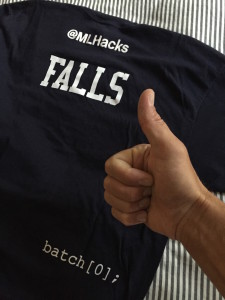Howdy!
I’m Tim Falls – VP, Community at Keen IO. I’ve been involved with hackathons for the last five years of my life. Over the past year or so, as I joined Keen and became more focused on data analytics (cus that’s what we do), I’ve become more conscious of the data surrounding hackathons. In this guest post, which MLH is so generously sharing with its audience (you!), I wanted to shine a light on what’s emergently occurring in the world of university hackathons. My perspective is based on a set of observations I’ve made in working with the people who are and have been organizing HackTX for the past four years…
Hack ’em Horns!
Last weekend, we spent a bunch of quality time with the student hackers of the big state of Texas at HackTX, on the campus of The University of Texas at Austin. HackTX is in its fourth year, and the 2015 installment certainly lived up to expectations set by its past success. As Xavier Rotnofsky, UT’s student government president, noted in his opening remarks, “it [was] amazing to see how big the event has grown; traffic all over campus and people tailgating [for a college hackathon]! ;-P
Taylor, my teammate and Austin-based developer evangelist, was there for her fourth time and her first time not holding the title of organizer (she helped found and operate HackTX from 2012-14 as a student at UT.) I actually met Taylor when my team at SendGrid (my last role) sponsored HackTX in its inaugural year.

Peter, a member of the Keen’s engineering team, was also there for his first university hackathon experience! Peter is an awesome example of how everyone at Keen does community =)
As a team of community-minded, devangelistic folks, we’ve done a lot of hackathon’ing, on behalf of companies like SendGrid, Mashery, Context.IO, Keen (duh:P), and even as honorary/temporary representatives of MLH!

Data, wut?
There was one noticeable aspect of HackTX that I hadn’t witnessed at other hackathons, throughout our collective experience: a focus on analytics!
We knew that the team of students who organize HackTX had been using Keen IO over the last few months; being part of the event gave us a chance to see their work in action and understand the value they could derive from their analytical efforts. We won’t go into the details of their implementation (here’z the codez) — they’re planning to blog about their data and analytics initiative soon, so stay tuned for fun, interesting insights that they’ve gained. =)
However, we did want to dig deeper into why the HackTX team has decided to integrate data analytics into their practices and how that has manifested. So, we asked them some Q’s…and, sure enough, we got some A’s!
What are the most important analytics/metrics for you at HackTX and for the hackathon community in general?
“HackTX is all about being a welcoming, inclusive event, and that means we want to have beginners, people in non-tech related fields, and diversity in gender. Being able to track metrics such as major, gender, and number of hackathons attended/graduation year really helps us see if we are doing our job in making a hackathon a great and welcoming event.” – Hayley Call
Why are these analytics important to you as a hackathon organizer?
“We can see who is coming to HackTX. We can see where we need to reach out to people. For example, this year we wanted to see an increase in the amount of first time hackers at our event and by using Keen.IO we could track how many beginners were signing up and change our outreach strategy accordingly.” – Hayley Call
As it turns out, members of multiple teams within the HackTX organization have made use of the information gained from their analyses – from the tech team, to logistics, to outreach. Based on their respective needs, they’ve been able to build dashboards to visualize important information, create funnels to understand the flow of attendees from application to acceptance to participation, and run ad hoc data analysis on signups, confirmed attendees, and check-ins (using Keen’s Open Source Data Explorer.)
Benefits of data-diligence to hackathon organizers
- Make truly data-informed decisions in all facets of the project: marketing, outreach, event logistics, mentoring, judging, supplies/equipment, etc.
- Identify/understand trends as they emerge in a single event, and (looking forward) as they evolve from year to year; just as importantly, adjust actions with these trends in mind
- Cultivate an asset of information, valuable not only to the organizing team and the students it serves, but to the entire hackathon community — organizers, hackers, universities, organizations like MLH, other stakeholders
A few examples, for further grokking:
With data one could plausibly:
- Compare “Registrations” to “Check-ins” to discover trends amongst students who choose to not attend after signing up, and potentially figure out why are people not showing up? how can we decrease this number?
- Observe outreach campaigns to examine results based on specific majors, gender, racial identities, experience level, etc, and understand which message speaks best to various audiences?
- Compare attendee data from one year to the next and make educated guesses at what may have caused a delta between year 1 & 2
- For example, the HackTX team noticed that this year’s event had a surprising number of first time hackers (~54%.) Knowing this ahead of time (as registrations were collected leading up the event), allowed them to cater the event to be more supportive of new hackers.
Demo-time
So what’s the big deal? We think it’s awesome that data is being utilized in this way. Because we care about the hackathon and developer communities (as members of both), we hope that more of this happens — and does so in an open and collaborative manner!
That’s why we took the time to write this and share it with you; it’s why Taylor spoke about this topic at HackCon II. And it’s why we hope more folks follow the lead of the HackTX team.
With this story in mind, imagine all the good you could do (and nerdy fun you could have!) as a hacker, student, and/or hackathon organizer, if you collect data and apply it in good ways. Whether you use Keen IO or any other analytics tool out there, we’d be happy to help, so don’t be shy to give us a shout or ping us on Slack!